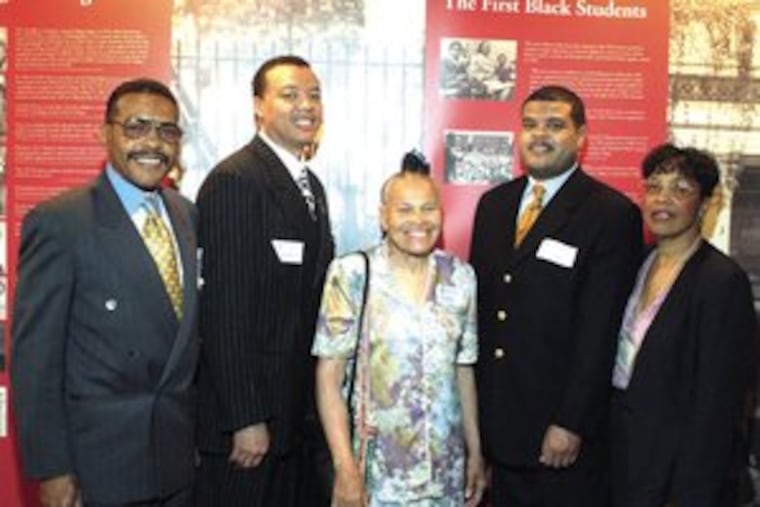Marie Hicks, 83, the Rosa Parks of Girard College
Her crusade in the 1960s led to the desegregation of the Phila. school.

Marie Hicks, who in 1965-66 led thousands of pickets, including the Rev. Dr. Martin Luther King Jr., around the wall that stood between two of her sons and entry into Girard College because they were black, died Thursday of complications of Parkinson's disease at Willow Terrace in Germantown. She was 83 and lived in Germantown.
The 10-foot wall and what it symbolized at Girard College inspired one of the most dramatic civil rights confrontations in Philadelphia history.
"Mrs. Hicks was our Rosa Parks," Girard president Dominic M. Cermele said yesterday. "In 2004, when the Pennsylvania Museum put up the exhibit 'Overcoming Barriers: The Integration of Girard College' at a state luncheon with the Hicks family, something clicked," Cermele said.
"I told Mrs. Hicks, 'On behalf of Girard College, I apologize to you. I am sorry you had to fight so hard and wait so long for your children to be admitted. And this is long overdue.' We hugged each other."
Cermele said, "If I were them, I would have been resentful. I applied to Girard in 1947 and got in the next year without any hassle. I graduated in 1959."
The journey to Girard began in 1965, when Mrs. Hicks wanted two of her sons, Charles and Theodore, to be admitted to the whites-only school.
Her husband, Junius Hicks Sr., a World War II veteran who worked in a knitting mill and was a pilot, motorcyclist and watchmaker, died of cancer in 1964. Girard College had relaxed founder Stephen Girard's orphans-only ban and accepted fatherless white boys.
Mrs. Hicks had gotten a peek behind the wall during a Boy Scout ceremony when her eldest son, Junius Jr., received a badge in front of Founder's Hall.
"When I saw how beautiful everything was, it made me even more angry that no black boys were allowed in. I figured that I would never get in there again," she told the Philadelphia Daily News in 1985.
Cecil B. Moore, president of the Philadelphia NAACP, who had already thrown up picket lines at Girard in June 1965, learned of Mrs. Hicks and her sons. He and lawyer William T. Coleman thought Mrs. Hicks was the kind of trailblazer they were looking for to join three other parent plaintiffs in a federal discrimination suit against the school.
In July 1965, they asked her to join the suit. It was the beginning of an ugly battle for Girard that ended in May 1968, when the U.S. Supreme Court threw out the last appeal to maintain the school for whites only. The Hicks family had endured more than 200 death threats, son Theodore Hicks said.
"I was an eyewitness to Mrs. Hicks marching at that wall every day for more than a year," Bernard Smiley, chairman of the Board of Directors of City Trusts, the appointed agency that oversees Girard College, said yesterday.
"My father was there when Dr. King came to the wall. If there were one leader of the plaintiffs, it would be Marie Hicks. Her tiny stature - she was less than 5 feet tall - and her fiery, dynamic personality made her all the more effective as the spokesperson for those trying to gain entrance into Girard College."
Finally, in September 1968, Theodore, then 9, and three other black students began classes at Girard. The court case had taken so long that son Charles was then 12, and Girard did not admit students older than 10. The school made an exception and Charles enrolled four months later.
Twenty years after the Supreme Court's 1954 landmark school-desegregation case, Brown v. Board of Education, Charles became the first black graduate. Theodore, who graduated in 1977, was the first African American valedictorian.
Born in 1923, Mrs. Hicks grew up in Harlem in a family of seven children. She moved to North Philadelphia after graduating from high school and married Junius.
The couple and their four children settled in North Philadelphia.
Mrs. Hicks was a Cub Scout den mother at Girard College until her health began to fail a few years ago.
"She constantly came back here," Cermele said. "She encouraged prospective students and parents to take advantage of the excellent education at this college."
After motivating her children to earn college degrees, Mrs. Hicks got a job as a maid at La Salle University. She attended night classes and in 1980, when she was 58, earned a bachelor's in sociology there.
She counseled homeless women at Mercy Hospice in Center City and worked for the Archdiocese of Philadelphia. She retired 10 years ago.
"Marie Hicks was very persistent and amusing," Cermele said. "She rode motorcycles. She told me one day she found a woman sitting on her husband's motorcycle. 'I had to beat her up,' she said. 'She was in my seat.' "
In addition to her three sons, Mrs. Hicks is survived by a daughter, Loretta Hicks Mason, and a sister, Anna Allen.
The family is planning a funeral for next week. "We hope to circle the Girard wall one last time, go through the gates and around the Stephen Girard statue and Founders Hall before proceeding to the cemetery," Charles said.
"Girard now has 85 percent African American, 55 percent female, 5 percent Latino, 10 percent Asian students and the rest are Caucasian and multi-racial," Cermele said. "I believe if Stephen Girard were alive today, these are precisely the children he would want here - poor children from single-parent families who are in need."